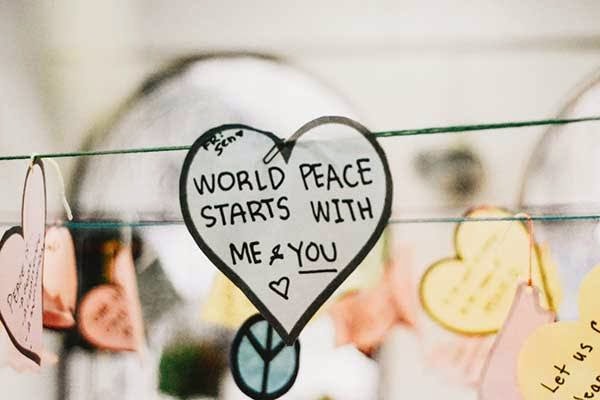
“The war will end. The leaders will shake hands. The old woman will keep waiting for her martyred son. That girl will wait for her beloved husband. And those Children will wait for their heroic father. I don’t know who sold our homeland. But I saw who paid the price.” (Mahmoud Darwish)
The greatest challenge that the gospel sets before each one of us is to love. Christianity is a way of life, and it is all about being in relationship with God and our fellow brethren. The Triune God, who is united in love and living in a relationship, invites each one of us to enter into communion with the Triune God through Jesus and also enter into communion with fellow brethren. If we live a life of genuine communion with the Triune God, then that life of communion will be reflected in our relationship with our fellow brethren. This life of communion should not be compartmentalized in the name of religion, sect, caste, colour, etc. We should be able to love everyone in spite of their caste, colour, religion, cultural background, etc.
In today’s gospel, we see one of the scribes asking Jesus, “Teacher, which commandment in the law is the greatest?” (Mt. 22:36) The scribe is a person who has mastered the laws of Moses and has authority to teach and interpret the laws. So we can presume that he already knew the answer. So the intention behind his question is to test the wisdom of this itinerant Galilean preacher. The scribe would have taken it for granted that if Jesus gave one of the first three commandments, which define one’s duty towards God, then he could ask, why not the remaining seven commandments, which explain one’s responsibility towards fellow brethren? Are they not important? If Jesus points out one of the last seven commandments as the most important, then he could ask why one’s responsibility towards God is not important.
Knowing their intention, Jesus gives Shema Israel, which the Israelites recite in their prayer time: “You shall love the Lord your God with all your heart, with all your soul, and with all your mind.” (Mt. 22:37) In fact, Jesus summarized all the ten commandments into two. Now the scribe can neither say Jesus gave priority to one of the first three commandments nor the remaining seven taken from the book of Exodus as to how they need to relate to their neighbours: “You shall not wrong or oppress a resident alien, for you were aliens in the land of Egypt. You shall not abuse any widow or orphan. If you do abuse them, when they cry out to me, I will surely heed their cry.” (Ex. 22:21-23) When I am able to give priority to my brethren’s needs like mine, I love them as I love myself.
These days, we are saddened and disturbed by the news coming from Israel and Gaza. Our basic inclination is either to support Israel or Hamas. We can never justify the bloodshed both parties have done in order to defend their cause. Instead of living in brotherly communion, they kill each other. Many children are already killed in this war; isn’t something similar to Herod massacring holy innocence for his power and fame? We can’t kill anyone in the name of God because, for Abba, all are his children, in spite of their caste, colour, and religion. Again, taking revenge and denying the basic necessities such as water, food, medicine, and electricity to those who are affected is a great human rights violation. A country may have the most powerful weapon that could destroy everything, but if someone is keeping grudges and hatred against them, then we can be sure that they are not fully safe. Love is the only means to heal the wounds created by war and various forms of violence. Let us earnestly pray so that the war between Israel and Hamas may end soon and that they may live in peace and love.